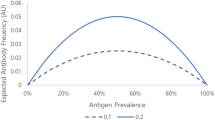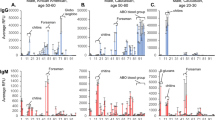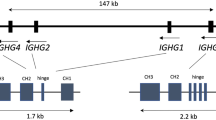Abstract
The Lutheran blood group system was first described by Callender and Race1 in 1946: an antibody, afterwards named anti-Lua, was found to react with the red cells of approximately 8 per cent of the English population. The antigen with which the antibody reacts is called Lua and can be recognized in the red cells of heterozygous as well as homozygous individuals. The corresponding gene is called Lua and an allele Lub is postulated. The antigen Lub has been recognizable so far only as an absence of Lua; thus persons of the phenotype Lu(a–) are presumed to be of the genotype Lua Lub.
This is a preview of subscription content, access via your institution
Access options
Subscribe to this journal
Receive 51 print issues and online access
$199.00 per year
only $3.90 per issue
Buy this article
- Purchase on Springer Link
- Instant access to full article PDF
Prices may be subject to local taxes which are calculated during checkout
Similar content being viewed by others
References
Callender, Sheila T., and Race, R. R., Ann. Eugen., 13, 102 (1946).
Race, R. R., and Sanger, Ruth, “Blood Groups in Man”, 2nd edit. (Blackwell Scientific Publications, Oxford, 1954).
Author information
Authors and Affiliations
Rights and permissions
About this article
Cite this article
CUTBUSH, M., CHANARIN, I. The Expected Blood-Group Antibody, anti-Lub. Nature 178, 855–856 (1956). https://doi.org/10.1038/178855b0
Issue Date:
DOI: https://doi.org/10.1038/178855b0
Comments
By submitting a comment you agree to abide by our Terms and Community Guidelines. If you find something abusive or that does not comply with our terms or guidelines please flag it as inappropriate.



